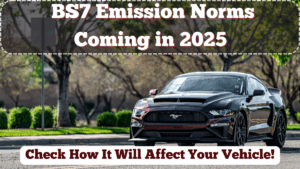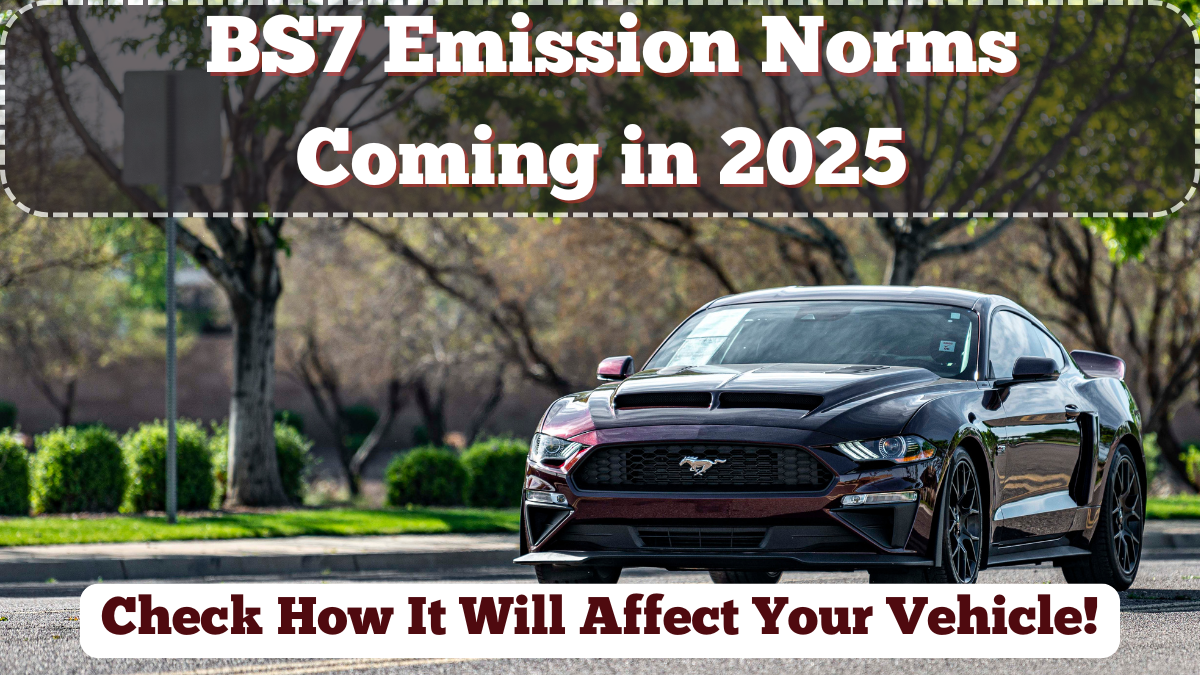The BS7 emission norms update India will come into effect starting October 2025, bringing a significant transformation to India’s automobile and fuel industries. Bharat Stage (BS) norms regulate the permissible levels of pollutants from vehicle exhausts, and this next phase introduces tougher standards for all new vehicle registrations. The transition from BS6 to BS7 norms India is seen as a major step toward meeting global emission benchmarks and improving urban air quality.
With rising pollution levels in metropolitan cities and the country’s climate commitments under global environmental agreements, the vehicle emission rules are being made more stringent. The upcoming norms will apply to all categories of vehicles—petrol, diesel, CNG, and hybrid—making compliance mandatory for manufacturers and owners alike. These changes aim to reduce harmful emissions like NOx (nitrogen oxides), particulate matter (PM), and hydrocarbons.

What’s changing in BS7 norms India?
The BS7 emission norms update India will require car and bike manufacturers to install advanced emissions control technologies. This includes Real Driving Emissions (RDE) testing, onboard diagnostic (OBD) systems, and particulate filters even in petrol vehicles. These updates will bridge the gap between lab-based testing and actual road performance, ensuring vehicles pollute less in real-world conditions.
Here’s what the updated emission policy includes:
-
Introduction of RDE (Real Driving Emission) tests for all new models
-
Mandatory OBD Stage II devices to monitor emissions in real-time
-
Stricter NOx and PM limits across petrol and diesel vehicles
-
Installation of gasoline particulate filters (GPFs) for petrol engines
-
Tighter regulations under RTO 2025 norms for registration and certification
The objective is to build a fleet of cleaner, smarter vehicles that meet global environmental expectations. With BS7 norms India, the government is targeting a long-term reduction in vehicular pollution without compromising on fuel efficiency or performance.
Impact on vehicle buyers and resale value
For vehicle buyers, the BS7 emission norms update India means stricter scrutiny of vehicles during purchase and resale. After the implementation, all new vehicles sold must be BS7-compliant, and non-compliant inventory may become unsellable without special clearances. Vehicle registration under RTO 2025 rules will also demand updated certificates confirming adherence to BS7 limits.
Older vehicles running on BS4 or even BS6 standards may face depreciation in resale value, especially in stricter emission zones like Delhi NCR, Mumbai, and Bengaluru. However, owners of non-compliant vehicles will be allowed to retain them until end-of-life policies kick in, though resale and transfer may become increasingly restricted.
What this means for buyers:
-
New vehicles will be more expensive due to advanced components
-
Used vehicles may lose market value rapidly in urban areas
-
Registration norms under RTO will include emission checks
-
Transition phase may bring discounts on BS6 stock
Manufacturer responsibilities and RTO 2025 compliance
Manufacturers are expected to upgrade engines, exhaust systems, and software to meet the new standards. These updates will also require new testing certifications and clearances from ARAI and RTO authorities. The RTO 2025 compliance system will be fully digital, integrating emission checks with vehicle registration databases.
To support this transition, many companies have begun redesigning their product lines with cleaner engines and lighter frames. Both Indian and international brands are investing in EV alternatives to avoid complex emission upgrades. This shift is also expected to speed up the development of hybrid and electric vehicles in the country.
Key compliance areas for BS7:
-
Approval from ARAI for BS7-compliant engines
-
OBD diagnostics to detect emission failures instantly
-
Periodic emission checks during vehicle renewal
-
Enforcement through RTO 2025 and city-based pollution control boards
These updates will make the Indian automobile market more aligned with international practices, paving the way for better air quality and fuel efficiency.
Why BS7 is essential for India’s clean air mission
The BS7 emission norms update India is a crucial step in India’s clean mobility journey. According to environmental experts, transport contributes over 25% to urban air pollution, and outdated engine technologies are a big reason. The BS7 rollout shows that the government is serious about reducing emissions and promoting eco-friendly practices.
By enforcing global-level vehicle emission rules, India aims to become a cleaner, healthier, and more responsible mobility market. BS7-compliant vehicles may be costlier upfront, but they promise cleaner air, better mileage, and longer-term resale value.
FAQs
What is the BS7 emission norms update India?
It refers to the seventh phase of Bharat Stage emission standards aimed at lowering pollution from vehicles through advanced technology and stricter limits.
When will BS7 norms India be implemented?
The new norms are expected to be enforced nationwide starting from October 2025, affecting all new vehicle registrations and approvals.
Will BS6 vehicles still be allowed after BS7 starts?
Yes, BS6 vehicles will still be allowed to run but may face restrictions in some cities. However, all new registrations must comply with BS7 norms India from the implementation date.
How do BS7 rules affect used car resale?
Used cars with BS4 or BS6 engines may experience faster depreciation and limited transferability, especially in high-pollution zones regulated by RTO 2025.
What changes will manufacturers need to make?
Manufacturers must upgrade their engines with features like OBD-II, GPFs, and RDE testing systems to meet the latest vehicle emission rules under BS7.
Click here to know more.
